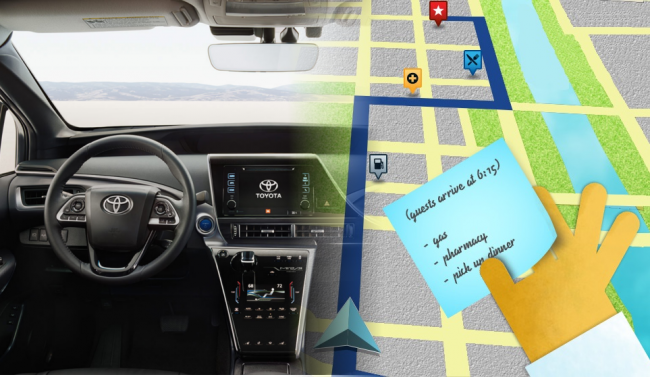
Casualties are in no small part rooted in stress. In California, for example, drivers can avoid a first ticket by attending driving school. One might expect California driving schools to focus on reinforcing the rules of the road. Instead, they focus on teaching drivers about techniques for stress and time management, as a way to address overly aggressive, reckless driving behavior.
Improving safety by reducing stress requires a strategic view. Our research problem is to develop a driver’s assistant that improves driving experience and safety, by acting as a personal assistant, travel planner, navigator and stress reducing coach. The assistant will accomplish this by helping the driver in four different aspects. First, our assistant will help drivers avoid aggressive risky driving, by planning and scheduling activities with sufficient safety margin, and by monitoring progress, disruptions and unacceptable risks. Second, our assistant will proactively suggest ways to relax user goals and activities, in order to reduce risks and increase safety. Third, our assistant will help the driver focus on driving, by taking on the task of coordinating with other individuals and their personal assistants, in order to adapt plans, and by only informing the driver on an as needed basis. Finally, our assistant will always create a backup plan, by identifying what could most likely go wrong, and by always leaving options open to adapt.
We envision a driver's assistant analogous to "Siri", but much more capable and knowledgeable about personal goals, travel, driving and coordination. Our assistant, call it "Uhura," differs from Siri, Google Now and Cortana, in that Uhura will be an expert about planning and monitoring risks, an expert at collaborating with the driver to relax goals and adapt when things go wrong, an expert at communicating and coordinating with others that are affected by disruptions, and an expert at planning contingencies for likely failures. Uhura will know the context of the driver's life and goals, will know the context of the environment, including the status and goals of other automobiles in the neighborhood, and the context of other individuals involved in the drivers daily activities. Uhura will also know general information, such as weather, road conditions, topography of terrain, and the location of facilities, such as restaurants and service stations. Uhura will use this information to generate sensible advice that strives to meet user preferences without incurring too much risk, and will communicate this advice in a natural way, through a combination of speech and displayed visual cues.
Publications:
- N. Bhargava, C. Muise, and B. Williams, “Variable-Delay Controllability,” in Proceedings of the Twenty-Seventh International Joint Conference on Artificial Intelligence, Stockholm, Sweden, 2018, pp. 4660–4666 [Online]. Available: https://doi.org/10.24963/ijcai.2018/648
- N. Bhargava, C. Muise, T. Vaquero, and B. Williams, “Managing Communication Costs under Temporal Uncertainty,” in Proceedings of the Twenty-Seventh International Joint Conference on Artificial Intelligence, Stockholm, Sweden, 2018, pp. 84–90 [Online]. Available: https://doi.org/10.24963/ijcai.2018/12
- N. Bhargava and B. C. Williams, “Complexity bounds for the controllability of temporal networks with conditions, disjunctions, and uncertainty,” Artificial Intelligence, vol. 271, pp. 1–17, Jun. 2019 [Online]. Available: https://doi.org/10.1016/j.artint.2018.11.008. [Accessed: 07-Oct-2019]
- N. Bhargava and B. Williams, “Multiagent Disjunctive Temporal Networks,” in Proc. of the 18th International Conference on Autonomous Agents and Multiagent Systems (AAMAS 2019), 2019 [Online]. Available: https://dl.acm.org/citation.cfm?id=3331727
- S. Dai, M. Orton, S. Schaffert, A. Hofmann, and B. Williams, “Improving Trajectory Optimization using a Roadmap Framework,” in IROS 2018, 2018 [Online]. Available: https://doi.org/10.1109/IROS.2018.8594274
- S. Dai, M. Orton, S. Schaffert, A. Hofmann, and B. Williams, “Improving Trajectory Optimization using a Roadmap Framework (ICAPS 2018),” in Planning and Robotics Wrokshop, 2018 [Online]. Available: http://arxiv.org/abs/1811.02044
- P. Yu, B. Williams, C. Fang, J. Cui, and P. Haslum, “Resolving Over-Constrained Temporal Problems with Uncertainty through Conflict-Directed Relaxation,” Journal of Artificial Intelligence Research, vol. 60, pp. 425–490, Oct. 2017 [Online]. Available: https://doi.org/10.1613/jair.5431
- P. Yu, J. Shen, P. Z. Yeh, and B. Williams, “Resolving Over-Constrained Conditional Temporal Problems using Semantically Similar Alternatives,” in Proceedings of the Twenty-Fifth International Joint Conference on Artificial Intelligence (IJCAI-16), 2016 [Online]. Available: https://dl.acm.org/citation.cfm?id=3061053.3061083
- P. Yu, J. Shen, P. Z. Yeh, and B. Williams, “Towards Personal Assistants that Can Help Users Plan,” in Intelligent Virtual Agents, vol. 10011, D. Traum, W. Swartout, P. Khooshabeh, S. Kopp, S. Scherer, and A. Leuski, Eds. Cham: Springer International Publishing, 2016, pp. 424–428 [Online]. Available: https://doi.org/10.1007/978-3-319-47665-0_47


